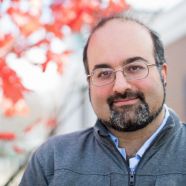Omid Safi
Omid Safi is a leading Muslim public intellectual. He is the director of the Duke Islamic Studies Center (http://islamicstudies.duke.edu/). The Duke Islamic Studies Center is one of the leading institutions for research on Islam and promoting publicly accessible scholarship on Islam and Muslim communities worldwide.
Omid is a professor of Islamic Studies and specializes in contemporary Islamic thought and Islamic spirituality. He is the chair for the Islamic Mysticism group at the American Academy of Religion, the largest international organization devoted to the academic study of religion. Omid is an award-winning teacher and speaker and has been nominated ten times for professor of the year awards at Duke University, the University of North Carolina, and Colgate University.
He is the editor of the volume Progressive Muslims: On Justice, Gender, and Pluralism. In this ground-breaking volume, he inaugurated a new understanding of Islam rooted in social justice, gender equality, and religious/ethnic pluralism. His work Politics of Knowledge in Premodern Islam, dealing with medieval Islamic history and politics, was published in 2006. His Memories of Muhammad is an award-winning biography of the Prophet Muhammad. His last volume on American Islam was just published by Cambridge University Press. He has a forthcoming volume from Princeton University Press on the famed mystic Rumi. The Carnegie Foundation recognized Omid as a leading Scholar of Islam in 2007-2008.
Omid has been among the most frequently sought speakers on Islam in popular media, appearing frequently in the New York Times, Newsweek, Washington Post, PBS, NPR, NBC, BBC, CNN, and international media. He regularly blogs at On Being (http://www.onbeing.org/). He leads a summer program in Turkey, Illuminated Tours (http://www.illuminatedtours.com/), which focuses on the spiritual dimension of Islam and the rich encounter of Islam, Christianity, and Judaism there. The program is open to everyone, and Omid invites the readers to join him on that journey.
Ten Things I Can’t Do Without
- The sound of my children giggling
- The fingers of my Beloved, wrapped around mine
- The eyes of that Beloved, where love flows and overflows
- My father’s voice, reciting the wisdom of ancients through poetry
- My mother’s heart, poured into her cooking
- Slow walks in the woods
- The way that reading mystical poetry reminds me again that the love of God mingles through humanity
- Istanbul
- Kindness of humanity, affirming my faith in goodness after it has been shaken to the core
- Yearning. Yearning for long-departed homelands, for Esfahan, for ancestors, for love, for being better than I am today, for connection, for community, for God.







